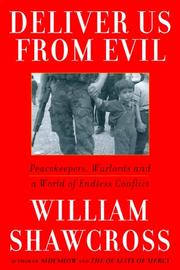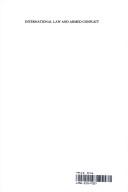| Listing 1 - 10 of 200 | << page >> |
Sort by
|
Book
ISBN: 9789050959247 Year: 2009 Publisher: Antwerp Oxford Portland Intersentia
Abstract | Keywords | Export | Availability | Bookmark
 Loading...
Loading...Choose an application
- Reference Manager
- EndNote
- RefWorks (Direct export to RefWorks)
Administrative law --- Law of armed conflicts. Humanitarian law --- Belgium
Book

ISBN: 9789077022863 Year: 2008 Volume: 2008/6 Publisher: Antwerpen Pax Christi Vlaanderen
Abstract | Keywords | Export | Availability | Bookmark
 Loading...
Loading...Choose an application
- Reference Manager
- EndNote
- RefWorks (Direct export to RefWorks)
Book
Abstract | Keywords | Export | Availability | Bookmark
 Loading...
Loading...Choose an application
- Reference Manager
- EndNote
- RefWorks (Direct export to RefWorks)
Law of armed conflicts. Humanitarian law --- Eichmann, Adolf
Book
ISBN: 9781780683140 1780683146 Year: 2015 Volume: 18 Publisher: Antwerpen: Intersentia,
Abstract | Keywords | Export | Availability | Bookmark
 Loading...
Loading...Choose an application
- Reference Manager
- EndNote
- RefWorks (Direct export to RefWorks)
Acts perpetrated during the course of warfare have, through the ages, led to significant environmental destruction. These have included situations where the natural environment has intentionally been targeted as a ‘victim’, or has somehow been manipulated to serve as a ‘weapon’ of warfare. Until recently, such acts were generally regarded as an unfortunate but unavoidable element of armed conflict, despite their potentially disastrous impacts. The existing international rules have largely been ineffective and inappropriate, and have in practical terms done little to deter deliberate environmental destruction, particularly when measured against perceived military advantages. However, as the significance of the environment has come to be more widely understood and recognised, this is no longer acceptable, particularly given the ongoing development of weapons capable of widespread and significant damage. This book therefore examines the current international legal regime relevant to the intentional destruction of the environment during warfare, and argues that such acts should, in appropriate circumstances, be recognised as an international crime and should be subject to more effective rules giving rise to international criminal responsibility. It also suggests a framework within the Rome Statute of the International Criminal Court as to how this might be achieved.

ISBN: 068483233X Year: 2000 Publisher: New York ; London ; Toronto [etc.] Simon and Schuster
Abstract | Keywords | Export | Availability | Bookmark
 Loading...
Loading...Choose an application
- Reference Manager
- EndNote
- RefWorks (Direct export to RefWorks)

ISBN: 3515059776 9783515059770 Year: 1992 Volume: 46 Publisher: Stuttgart: Steiner,
Abstract | Keywords | Export | Availability | Bookmark
 Loading...
Loading...Choose an application
- Reference Manager
- EndNote
- RefWorks (Direct export to RefWorks)
Book
ISBN: 9780199941445 Year: 2013 Volume: 2 Publisher: Oxford [etc.] Oxford University Press
Abstract | Keywords | Export | Availability | Bookmark
 Loading...
Loading...Choose an application
- Reference Manager
- EndNote
- RefWorks (Direct export to RefWorks)
WAR (INTERNATIONAL LAW) --- COUNTERINSURGENCY --- Human rights --- Polemology --- International law --- Law of armed conflicts. Humanitarian law
Book
ISBN: 9789082322774 Year: 2017 Publisher: Bruxelles Fondation de la mémoire contemporaine
Abstract | Keywords | Export | Availability | Bookmark
 Loading...
Loading...Choose an application
- Reference Manager
- EndNote
- RefWorks (Direct export to RefWorks)
Book
ISBN: 9780990689386 9780990689355 Year: 2018 Publisher: Denver Milbrown Press
Abstract | Keywords | Export | Availability | Bookmark
 Loading...
Loading...Choose an application
- Reference Manager
- EndNote
- RefWorks (Direct export to RefWorks)
The true story of young, untested American volunteers who entered German-occupied Belgium to attempt what had never been done before -- save an entire nation from starvation that was trapped in the middle of a world war. One of America's greatest humanitarian efforts is little-known today. WWI Crusaders brings the past to life by telling the personal stories behind the facts in an as-it's-happening style. During WWI (1914-1918), the American-led Commission for Relief in Belgium (CRB) initiated, organized, and supervised the largest food relief program the world had ever seen. The CRB and its Belgian counterpart, the Comite National (CN), fed for four years nearly 10 million Belgians and northern French trapped behind German lines. The relief efforts faced huge logistical challenges, international intrigues, and internal conflicts between the leaders of the CRB and CN. Young, idealistic Americans volunteered to go into German-occupied Belgium to guarantee the relief food would not be taken by the Germans. These humanitarian crusaders, known as CRB delegates, had to maintain strict neutrality as they watched the Belgians suffer under the harsh German regime. They also had to deal with a faction of Belgians who resented the Americans' presence and tried to limit their authority. WWI Crusaders is the first book for general readers that tells in one volume the interlacing stories of German brutality, Belgian resistance, and the young Americans who went into German-occupied Belgium. The situation in German-occupied Belgium during the war caused a tumbling together of extraordinary people into a chain reaction of life-and-death situations far from the trenches and killing fields of World War I. And hanging in the balance were millions of civilian lives. Through lively personal stories, this nonfiction book follows a handful of young CRB delegates, a 22-year-old Belgian woman, two American diplomats, the leaders of a Belgian underground newspaper, and the founder of the CRB, who would become known to the world as the Great Humanitarian. His name was Herbert C. Hoover. The book covers from the beginning of the war to May 1917, when the last Americans left Belgium because of America's April entry into the war. An extensive epilogue wraps up all major stories and people through the end of the war and beyond. It is a story that few have heard.
Book
ISBN: 9781839701054 9781839701603 Year: 2021 Publisher: Cambridge Antwerp Chicago Intersentia
Abstract | Keywords | Export | Availability | Bookmark
 Loading...
Loading...Choose an application
- Reference Manager
- EndNote
- RefWorks (Direct export to RefWorks)
On 2 April 2013, the United Nations General Assembly adopted the Arms Trade Treaty and on 24 December 2014, it entered into force. This marked the end of a long road towards achieving the first global treaty regulating the international trade in conventional arms and preventing their illicit trade and diversion. This book offers readers a concise and workable insight into each of the Articles of this important legal instrument, as well as its negotiation and scope of application. It brings together renowned state practitioners, legal academics and non-governmental expert analysts with different perspectives and backgrounds, many of whom were directly involved in the negotiation of the Treaty itself. The Arms Trade Treaty will provide a comprehensive commentary to guide academics, officials, diplomats and others in the implementation of the Treaty.
Law of treaties --- Law of armed conflicts. Humanitarian law --- Polemology --- wapenhandel
| Listing 1 - 10 of 200 | << page >> |
Sort by
|

 Search
Search Feedback
Feedback About UniCat
About UniCat  Help
Help News
News